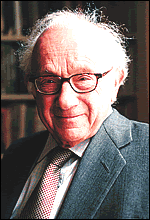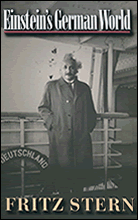 |
 |
 |
 |
|
COLUMBIA
FORUM "The American century began as the German one ended," notes Fritz Stern '46, University Professor Emeritus. A native of Breslau, Stern escaped Nazi Germany with his family in the 1930s. In his most recent collection of essays, Einstein's German World (Princeton University Press), the former University provost continues his lifelong fascination with "the ambiguities of German greatness" and "process of stoppable self-destruction," including a long chapter on the relationship between Albert Einstein and German scientist Fritz Haber. In this excerpt from the book's last chapter, which was originally delivered in Berlin on June 1, 1995, before a panel of German and Polish notables, all of whom had been uprooted from their homes during World War II, Stern discusses the ticklish questions of borders after the collapse of the Soviet Union.
I myself shall never forget my father's tears when the train pulled out of Breslau, when we left his hometown in September 1938. I had never seen paternal tears before; it was a singular outburst of feeling, grief at a shattered past, anxiety about an uncertain future. As a boy of twelve, I felt nothing but joy, for I was escaping the abominations of that time and place. And still: when a German interviewer several years ago asked me, "What comes to your mind when you hear the word 'Heimat'?" my instant, unreflected answer surprised me: "Heimatlos," or homeless. There are, after all, many ways of losing a homeland. One can be dispossesed of one's homeland while physically still at home, an experience suffered by millions in this century. To have lost one's homeland has been a recurrent fate, and like war - indeed usually a consequence of war - it is an integral part of world history. In our century, more than 100 million people have lost their lives or their homelands in war. As a historian and unwitting witness I concern myself with this theme. Expulsion and loss: in the beginning was the Word, and in the beginning was the primal pattern of expulsion, the expulsion from paradise. Banishment and expulsion are enduring historical features. And aren't the feelings of paradise lost, of innocence gone forever, the experience of every child as its early, all-protective world vanishes? We often see people regret the passing of a happily transfigured childhood; in our century perhaps childhood is also often negatively transfigured, seen as the source of trauma and transgression. Often people driven from their homelands - even like such children - live on falsely compressed memories, fastening most vehemently on what was good or what was bad. Hatred, envy, fear, and lust for power - these all-too-human motives have made expulsion from the homeland a recurrent phenomenon in world history. The twentieth century has witnessed a prolonged, bloody repetition of this horror. In previous centuries in Europe, people deemed different were frequent victims of persecution and expulsion - one thinks of the Jews and, after the Reformation, of Christians of warring denominations. Later came the political and ideological persecutions; exile has been a salient, often honorable, fate, especially in German and Polish history. In the course of nineteenth-century industrialization, millions of people were uprooted from the land, forced to find new abodes in the growing slums of Europe's cities. Our century has been even more cruel: consider the Armenians and the Greeks, the Spaniards forced to flee their country at the end of the Civil War, the victims of the Second World War, the Jews, Poles, the Russians - and the Germans who after 1933 became expellers and expellees by turns. There were as well millions of Muslims who fled India and Hindus who left Pakistan, the Palestinians, pieds noirs who had to abandon their Algerian homeland. Aggressive nationalism was responsible for many of these persecutions; in the Second World War, it was racial hatred and delirium that caused millions of deaths. Also, millions of so-called class enemies in the territories of the Soviet Union were deported or liquidated, and since 1989 we have witnessed the analogous tragedy of ethnic cleansing. The ideas we associate with the Enlightenment - tolerance and the recognition of human dignity - were in our century vilified and violated by the National Socialists and brutally set aside by other regimes as well. And yet the principles of the Enlightenment remained alive. In the underground cellars of the French Resistance - where to a fictive German friend, Albert Camus wrote that he loved his country too much to be a nationalist - or, more recently, in the East European opposition to Communism, Enlightenment ideals lived on.
Lost homeland - what does that mean? First it means a loss of property and sustenance. But the human-psychic loss cuts much deeper. Homeland signifies security; it forms a person's unconscious sense of self or, as a modern discourse puts it, it forms a person's identity. In what we call Heimat is bound up one's deepest feelings of attachment, involving nature itself: memories of specific woods and meadows, of streams and shapes of buildings, smells and sounds, of everything one was once accustomed to. Most often we connect family memories with our homeland, the recollection of some special place at home or garden linked to parents or cherished friends. Often enough it is only after its loss that we come to feel, to realize how irretrievably precious homeland really is, the true value of all that was familiar. Homeland is like the air we breathe: we are aware of it only when it isn't there or is poisoned. After its loss, an image lingers in memory, springing to consciousness at unexpected moments. Language reveals the pain: we speak of homesickness, Heimweh or mal du pays, of heartache when we are far from home. Heinrich Heine - the German Jewish poet in exile in Paris - was the classical poet of homesickness. He once observed: "It's an odd thing with patriotism, with true love of the fatherland. You can love your fatherland and reach the ripe old age of eighty and never be conscious of it, but then you have had to stay at home always. We recognize spring's inner essence first in winter, and the best poems about May are written around the stove. Love of freedom is a dungeon flower: only in prison does one feel freedom's worth. Thus, too, love for the German fatherland arises only at Germany's frontier, but most especially at the sight from abroad of Germany misfortune." The first time I chanced across these lines was November 8, 1992, a few hours before I was to speak at a memorial in New York for Willy Brandt. They fit Brandt perfectly, his love for his German homeland when in exile during the National Socialist years; an exile may loathe his country's tyrant and love the homeland all the more. The very word Heimat - with its special Germanic ring - often invites sentimentality - and one must guard against it. There have been the frightful expulsions that often ended in death. I focus on the survivors who have endured loss but whose individual fates and feelings often differ greatly. How a person responds to this calamity depends not only on given historic circumstances but on personal character, on age and temperament. After all, loss can also mean gain, the sense that in a new life, while loyal to the best of the old, one should pluck from injustice a new determination to fight every new injustice, to become a truly committed citizen. From EINSTEIN'S GERMAN WORLD by Fritz Stern. Copyright © 1999 by Princeton University Press. All rights reserved. Used by permission of Princeton University Press.
|
|
|||||||||||||||||||||||||||||||||||||||||||||||||||||||||||

